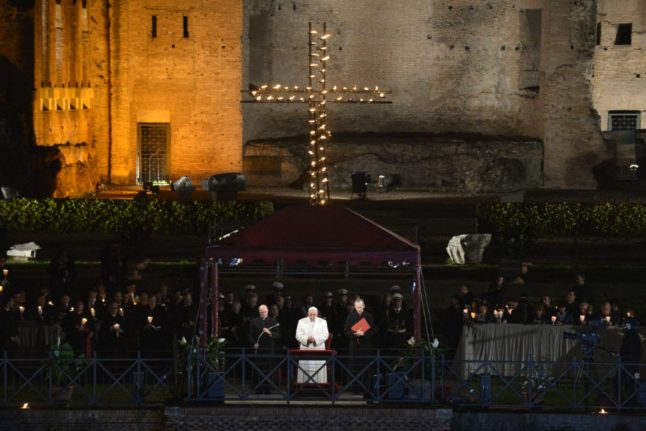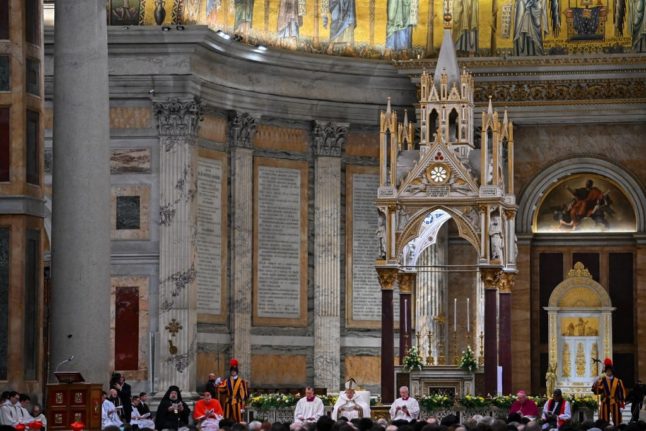For many Easter-celebrating people around the globe, this is a time to be with family, eat lots of chocolate, and maybe participate in a church service or two. But of course, traditions in each country are different.
After living in Italy for a while you might get used to seeing a certain dove-shaped cake (la colomba), the lack of a certain Easter figure (the Easter Bunny) and eating fish instead of meat on Good Friday.
But the first Pasqua (Easter Sunday) and Pasquetta (Easter Monday) you spend in the country will always come with its surprises.
No day off on Good Friday
Like many people who move to Italy, Robbie Sossi told us he was “absolutely astonished” to find that Good Friday was not a public holiday.
“We sent Easter cards to everyone, only to be met with quizzical looks when we next saw them. Families try to outdo each other in the chocolate Easter egg stakes too. I had a chocolate overdose headache for a week afterwards.”
One reader, Karen Short, said: “I too was surprised Good Friday wasn’t a public holiday.”
READ MORE: Why is Good Friday not a holiday in Italy
Abruzzo-based Stephanie Elms agreed and said: “Good Friday was a bit of a surprise for me because I know Europe has a few more holidays than where I’m from in the States, so I assumed it would be a holiday, but it isn’t.”
“It would have been nice to get an extra day like they have in the UK, but I’m not complaining. I get to celebrate Easter in a beautiful country and that’s enough for me.”
Freezing cold and rainy weather
When thinking of Mediterranean weather, sunshine and warmth is normally the first thing anyone would expect. But many people arriving in Italy for the first time are caught out by the unexpected cold.
Veneto-based artist Linda Winter said that, when she first arrived in Venice 18 years ago, she had a bit of a shock.
“The air was still chilly with the damp from the lagoon as I stepped onto the platform at Santa Lucia. Never having visited before I had imagined the fashion police would stop me from entering if I was anything less than elegant.
“The reality was that all the Italians were still wearing a heavy coat and at least two scarves. I froze.”
She advised anyone coming to Italy for Easter to wear a coat and wrap up warm.
“Early Easters are by their nature cold, even though as I write this sunshine is pouring through my open door. Now I hang onto my coat.”

Food galore
Food is of course a huge part of the celebrations in Italy. As in many countries, roast lamb is usually the meat of choice for an Easter Sunday lunch – but not everyone enjoys it.
Lazio resident Zoe Joanne Green said she finds the tradition of eating lamb “brutal”, adding: “I’ll spend Easter trying to distract myself so that I don’t get annoyed.”
Valeria La Capria said torta pasqualina instead is one Italian veggie option not to be missed.
“I’m also vegetarian, there are some great traditional dishes such as the torta di pasqua, made from spinach, ricotta and filo pastry.”
The tart is typical in the Liguria region of the country and traditionally had 33 layers of pastry, one for each year Christ was on earth.
READ MORE: Nine lesser-visited Italian villages to see over Easter
Tuscany resident Andrew Green said la colomba, a dove-shaped cake, is different from anything back home.
“For starters it’s a lot bigger and less sweet than what we usually eat in the UK,” he said. You can find them in pretty much every supermarket you go to.
“Back home we only really have hot cross buns and Easter cakes that are full of chocolate. There aren’t really any chocolate cakes here for Easter, but there is chocolate. Anyway, I prefer colomba instead and it was a nice surprise when I first ate it.”
Different regional events
That’s not the only thing Andrew prefers either. He said he loves the different events each Italian region has to offer.
“I stayed in Florence during my first year and there was a huge parade which was really cool. Obviously I knew nothing about it at first.”
The parade Andrew referred to is the Scoppio del Carro (Explosion of the Cart); a centuries old tradition where an old wagon is filled with fireworks and set alight outside of Florence’s Santa Maria del Fiore on Easter Sunday.
“The atmosphere of the whole city was alive and there was a huge buzz to the place. It was stunning,” Andrew adds.
Abruzzo-based Heather May also enjoys the events different regions have to offer, and said the nearby Madonna che scappa (the Virgin Mary who runs away) in a town named Sulmona was her personal favourite.
“It was nothing like I’d ever experienced before,” she writes. “It’s like a pantomime – one of the saints knocks on the door of a church at one end of the piazza, to tell the Madonna that her son is alive, she begins to march across the piazza (held aloft by holy men clad in green and white).
“After a swaying march of some minutes, she spots Christ at the other end of the piazza and the men break into a run – it’s quite a feat of athleticism! Doves are released, her black cloak drops to reveal a white dress and Handel’s hallelujah chorus plays as she encounters her son. It’s quite exhilarating even for protestants like myself.
Wherever you’ll be celebrating, Easter is bound to be special, but we hope these tips and anecdotes are useful to anyone spending their first Easter in Italy this year. Buona Pasqua.



 Please whitelist us to continue reading.
Please whitelist us to continue reading.
Member comments